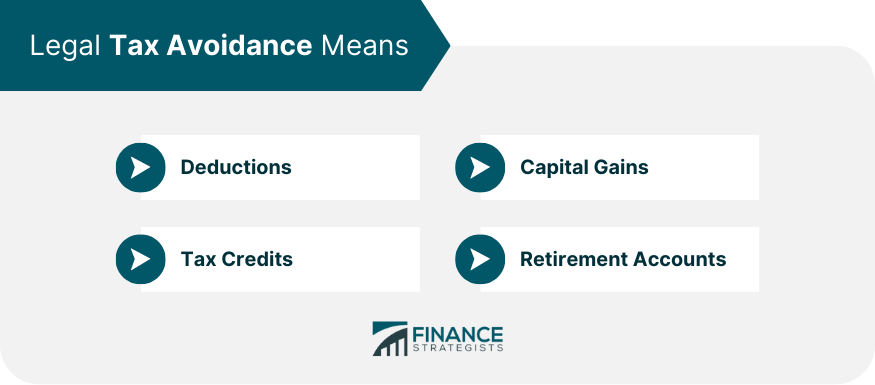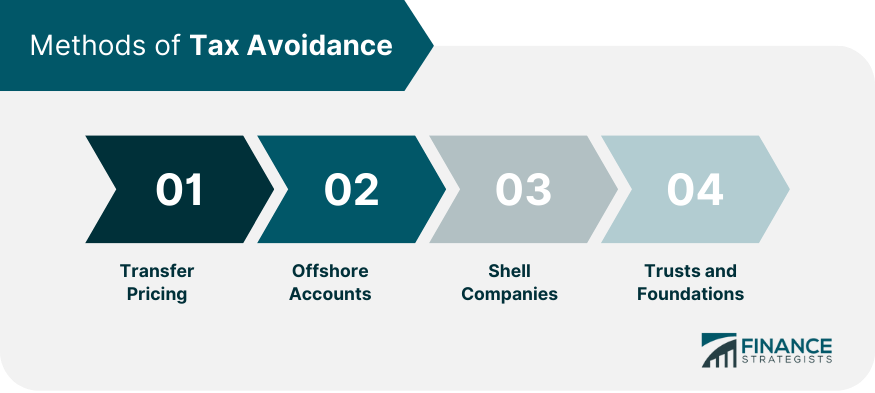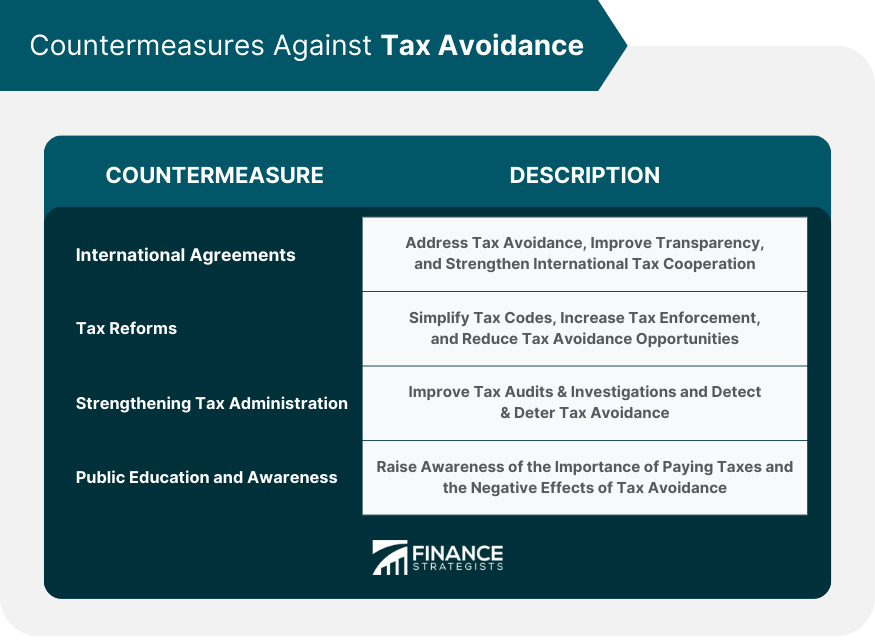Tax avoidance is a legitimate practice employed by individuals and businesses to reduce their tax liability by utilizing legal tax planning strategies. It involves taking advantage of available deductions, tax credits, and tax incentives to lower taxable income and ultimately decrease the amount owed in taxes. Tax avoidance enables individuals and businesses to effectively manage their finances, allocate resources, and make strategic investments. By minimizing their tax burden, taxpayers have more financial flexibility to reinvest in their businesses, support economic growth, and plan for their long-term financial goals, such as retirement. However, tax avoidance has generated debate and criticism. Some argue that aggressive tax avoidance practices can erode government revenue and hinder public services and infrastructure development. It is seen as exacerbating economic inequality by allowing wealthier individuals and corporations to reduce their tax obligations significantly while others may bear a larger burden of taxes. Deductions serve as a legitimate means for taxpayers to reduce their taxable income. By taking advantage of deductions such as business expenses, mortgage interest, and charitable donations, individuals and businesses can lower their overall tax liability. However, it is crucial to ensure compliance with tax laws and regulations to avoid potential legal issues. Tax credits are another legal avenue for reducing tax liability. Unlike deductions that lower taxable income, tax credits provide a dollar-for-dollar reduction in the actual tax owed. Various tax credits, including those for education, renewable energy, and child and dependent care expenses, offer opportunities for individuals and businesses to lower their tax burden. Capital gains refer to the profit earned from the sale of an asset, such as stocks, real estate, or artwork. Taking advantage of favorable capital gains tax rates, taxpayers can strategically time the sale of assets to minimize their tax liability. Proper tax planning and understanding of capital gains tax regulations are essential to ensure compliance and optimize tax benefits. Retirement accounts, such as 401(k)s and IRAs, offer taxpayers an opportunity to save for retirement while providing tax advantages. Contributions to these accounts are often tax-deductible or made with pre-tax income, allowing individuals to reduce their taxable income in the current year. Furthermore, earnings within retirement accounts grow tax-deferred until withdrawal, potentially resulting in significant tax savings over time. The ethical implications of tax avoidance are a subject of debate. Some argue that aggressive tax planning to minimize tax liability undermines the principle of contributing to society's common good through taxes. Critics claim that excessive tax avoidance by corporations and high-net-worth individuals leads to an unfair distribution of the tax burden and exacerbates income inequality. While tax avoidance is generally legal, there can be instances where it borders on or crosses into tax evasion, which is illegal. The distinction between the two can be complex, and tax authorities closely scrutinize aggressive tax planning strategies. Engaging in illegal tax evasion can result in severe penalties, including fines and even imprisonment. Public perception of tax avoidance often hinges on the fine line between legality and morality. High-profile cases of multinational corporations minimizing their tax liabilities through complex offshore structures have generated public outcry. Such instances have fueled the perception that tax avoidance by large corporations and the wealthy exploit loopholes and shift the tax burden onto ordinary citizens. Transfer pricing involves determining the prices at which goods, services, or intellectual property are exchanged between related entities within multinational corporations. By manipulating transfer prices, companies can shift profits to jurisdictions with lower tax rates, thereby reducing their overall tax liability. Although transfer pricing is a legitimate practice, aggressive tactics that manipulate prices beyond their true value can attract tax authority scrutiny. Offshore accounts refer to bank accounts or financial assets held in foreign jurisdictions. They can be used for legal purposes, such as facilitating international business transactions or asset protection. However, they can also be employed for tax avoidance purposes, allowing individuals and corporations to park funds in low-tax or tax-haven jurisdictions, potentially reducing their tax obligations. Shell companies are entities that exist on paper but have little to no active business operations. They are often established in jurisdictions with favorable tax laws or secrecy laws to provide anonymity for their owners. Shell companies can be used to obscure the true ownership of assets, facilitating tax evasion or other illicit activities. Trusts and foundations are legal entities that can be established for various purposes, including philanthropy, estate planning, and asset protection. They offer opportunities for tax planning, such as charitable donations and estate tax avoidance. However, they can also be used to obscure the true ownership of assets or transfer wealth to future generations while minimizing tax obligations. Tax avoidance can result in a significant loss of government revenue, potentially depriving governments of funds needed to provide essential public services. Large corporations and high-net-worth individuals engaging in aggressive tax planning strategies can shift their tax obligations to jurisdictions with lower tax rates, depriving other jurisdictions of much-needed revenue. The distributional effects of tax avoidance can exacerbate income inequality. As wealthier individuals and corporations shift their tax obligations to lower-tax jurisdictions, ordinary taxpayers may bear a greater burden of financing public services. Furthermore, tax avoidance can limit the government's ability to fund social welfare programs that benefit low-income individuals and families. Reduced government revenue resulting from tax avoidance can have a negative impact on public services. Governments may be forced to reduce spending on infrastructure, education, healthcare, and other essential services. This can limit economic growth, impede social mobility, and exacerbate income inequality. Aggressive tax planning strategies that cross the line into tax evasion can result in significant legal consequences. Tax authorities increasingly scrutinize complex tax structures and transactions, with non-compliance potentially leading to severe penalties, including fines, interest charges, and even imprisonment. International agreements, such as the OECD's Base Erosion and Profit Shifting (BEPS) initiative, seek to address tax avoidance and ensure that multinational corporations pay their fair share of taxes. Such agreements aim to improve transparency, reduce tax avoidance opportunities, and strengthen international tax cooperation. Tax reforms can also address tax avoidance by simplifying tax codes, closing loopholes, and increasing tax enforcement. Reform efforts may include a review of tax rates, deductions, and credits, as well as the implementation of new tax policies aimed at reducing tax avoidance. Effective tax administration is essential to ensure compliance with tax laws and regulations. Governments can strengthen tax administration by investing in technology and staff training to improve tax audits and investigations, as well as to detect and deter tax avoidance. Public education and awareness campaigns can help raise awareness of the importance of paying taxes and the negative effects of tax avoidance. By increasing understanding of tax regulations, taxpayers can make informed decisions, and governments can gain public support for tax reforms and countermeasures against tax avoidance. Tax avoidance is a legal practice used by individuals and businesses to minimize their tax liability through legitimate tax planning strategies. It enables taxpayers to effectively manage their finances, allocate resources, and make strategic investments. However, tax avoidance is not without controversy. Critics argue that aggressive tax planning can erode government revenue, exacerbate economic inequality, and hinder public services and infrastructure development. Various methods of tax avoidance, such as transfer pricing, offshore accounts, shell companies, and trusts, have been employed. The effects of tax avoidance include a loss of government revenue, increased inequality, and a negative impact on public services. To counter tax avoidance, international agreements, tax reforms, strengthening tax administration, and public education and awareness are important measures. By implementing these countermeasures, governments can address tax avoidance and ensure a fair and sustainable tax system for all.What Is Tax Avoidance?
Legal Tax Avoidance Means
Deductions
Tax Credits
Capital Gains
Retirement Accounts

Controversies Surrounding Tax Avoidance
Ethics of Tax Avoidance
Legal Issues
Public Perception
Methods of Tax Avoidance
Transfer Pricing
Offshore Accounts
Shell Companies
Trusts and Foundations

Effects of Tax Avoidance
Loss of Government Revenue
Increased Inequality
Negative Impact on Public Services
Possible Legal Consequences
Countermeasures Against Tax Avoidance
International Agreements
Tax Reforms
Strengthening Tax Administration
Public Education and Awareness

Conclusion
Tax Avoidance FAQs
Tax avoidance is the legal practice of minimizing tax liability by using deductions, credits, or other legal methods.
Tax avoidance is legal, while tax evasion is illegal. Tax avoidance is the act of reducing tax liability within the bounds of the law, while tax evasion involves hiding income or assets to avoid paying taxes.
Tax avoidance is a controversial practice. Some argue that it is unethical because it reduces government revenue and can contribute to economic inequality, while others see it as a legitimate way to minimize tax liability.
Some common methods of tax avoidance include transfer pricing, offshore accounts, shell companies, trusts, and foundations.
Countermeasures against tax avoidance include international agreements, tax reforms, strengthening tax administration, and public education and awareness.
True Tamplin is a published author, public speaker, CEO of UpDigital, and founder of Finance Strategists.
True is a Certified Educator in Personal Finance (CEPF®), author of The Handy Financial Ratios Guide, a member of the Society for Advancing Business Editing and Writing, contributes to his financial education site, Finance Strategists, and has spoken to various financial communities such as the CFA Institute, as well as university students like his Alma mater, Biola University, where he received a bachelor of science in business and data analytics.
To learn more about True, visit his personal website or view his author profiles on Amazon, Nasdaq and Forbes.











